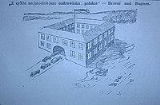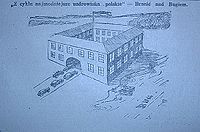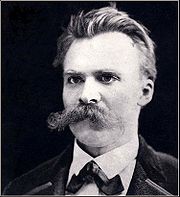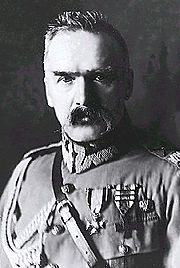
Polish legislative election, 1930
Encyclopedia
Polish legislative election, 1930, also known as the Brest elections , were the elections to the Sejm
(Polish parliament) on 16 November 1930. The pro-Sanacja
Bezpartyjny Blok Współpracy z Rządem party took 56% of the votes (247 out of 444 seats in Sejm
, and 76 out of 111 seats in Senate of Poland
). The elections are known as the least free elections in the Second Polish Republic
due to the Brest trial controversy.
by the pro-Sanacja
elements in the Polish government[ under the control of Józef Piłsudski (although Piłsudski left most of the details of the internal politics to others).
 The elections were supposed to take place in May, but the government invalidated the May results by disbanding the parliament in August and with increasing pressure on the opposition started a new campaign, the new elections being scheduled to November. Using the anti-government demonstrations
The elections were supposed to take place in May, but the government invalidated the May results by disbanding the parliament in August and with increasing pressure on the opposition started a new campaign, the new elections being scheduled to November. Using the anti-government demonstrations
as a pretext, 20 members of the oppositions, including most of the leaders of Centrolew
alliance (from Polska Partia Socjalistyczna, PSL "Piast" and PSL Wyzwolenie parties) were arrested in September without a warrant
, only on the order of the minister of internal security, Felicjan Sławoj Składkowski accusing them of plotting an anti-government coup. The opposition members (who included the former prime minister Wincenty Witos
, and the Silesia
n national hero, Wojciech Korfanty
) were imprisoned in the Brest Fortress
, where their trial took place (thus the popular name for the election: the 'Brest election'). A number of less known activists were arrested throughout the country. They were released after the end of the election in the same month. The Brest trial ended in January 1932, with 10 accused receiving sentences up to 3 years of imprisonment. Some of them decided to emigrate
instead.
 In addition, the minorities were also discriminated against; the government crackdown on opposition was especially hard in the eastern provinces , affecting the Blok Ukraińsko-Białoruski (Ukrainian-Belarusian Bloc) party.
In addition, the minorities were also discriminated against; the government crackdown on opposition was especially hard in the eastern provinces , affecting the Blok Ukraińsko-Białoruski (Ukrainian-Belarusian Bloc) party.
On Nov. 24, 1930, British magazine TIME
in his coverage of the elections wrote: During the campaign which ended in Poland's general election last week, opposition papers were so mercilessly censored that some were reduced to printing pictures of Friederich Wilhelm Nietzsche (1844-1900) with the caption : He Died Crazy. Because Dictator Josef Pilsudski has publicly made such statements as that "Parliament is a prostitute!" (TIME, July 9, 1928) and because he somewhat resembles Philosopher Nietzsche in face and whiskers, his government promptly confiscated all Nietzschean campaign pictures, all papers in which they appeared.
 Nonetheless despite the governments pressure, the opposition members (from Centrolew and endecja
Nonetheless despite the governments pressure, the opposition members (from Centrolew and endecja
) still sat in the parliament, soon in the new parliament they tried to pass the motion of no confidence
to the new government. The imprisonment and trial of political opponents was a setback for Polish democracy, but no genuinely open trials of political opponents such as the one in Poland took place elsewhere in contemporary Central Europe
The exception was the 1933 Berlin trial of the Bulgarian communist Georgy M. Dimitrov The success of BBWR, while certainly enhanced by the government crackdown on opposition, also stemmed from the fact that Sanacja and Piłsudski's held considerable support, and the Centrolew politicians were viewed as incapable in preventing the economic crisis (Great Depression
). The Centrolew coalition fell apart in 1931 due to internal conflicts.
The difference between the Piłsudski and Sanacja
dictatorial regime, and the post-World War II
People's Republic of Poland
communist totalitarian regime is well illustrated by the comparison of the 1930 elections, the least free elections in the Second Polish Republic, to the Polish legislative election, 1947
, the most free elections before 1989.
Sejm
The Sejm is the lower house of the Polish parliament. The Sejm is made up of 460 deputies, or Poseł in Polish . It is elected by universal ballot and is presided over by a speaker called the Marshal of the Sejm ....
(Polish parliament) on 16 November 1930. The pro-Sanacja
Sanacja
Sanation was a Polish political movement that came to power after Józef Piłsudski's May 1926 Coup d'État. Sanation took its name from his watchword—the moral "sanation" of the Polish body politic...
Bezpartyjny Blok Współpracy z Rządem party took 56% of the votes (247 out of 444 seats in Sejm
Sejm
The Sejm is the lower house of the Polish parliament. The Sejm is made up of 460 deputies, or Poseł in Polish . It is elected by universal ballot and is presided over by a speaker called the Marshal of the Sejm ....
, and 76 out of 111 seats in Senate of Poland
Senate of Poland
The Senate is the upper house of the Polish parliament, the lower house being the 'Sejm'. The history of the Polish Senate is rich in tradition and stretches back over 500 years, it was one of the first constituent bodies of a bicameral parliament in Europe and existed without hiatus until the...
). The elections are known as the least free elections in the Second Polish Republic
Second Polish Republic
The Second Polish Republic, Second Commonwealth of Poland or interwar Poland refers to Poland between the two world wars; a period in Polish history in which Poland was restored as an independent state. Officially known as the Republic of Poland or the Commonwealth of Poland , the Polish state was...
due to the Brest trial controversy.
Controversy
The elections were riggedElectoral fraud
Electoral fraud is illegal interference with the process of an election. Acts of fraud affect vote counts to bring about an election result, whether by increasing the vote share of the favored candidate, depressing the vote share of the rival candidates or both...
by the pro-Sanacja
Sanacja
Sanation was a Polish political movement that came to power after Józef Piłsudski's May 1926 Coup d'État. Sanation took its name from his watchword—the moral "sanation" of the Polish body politic...
elements in the Polish government[ under the control of Józef Piłsudski (although Piłsudski left most of the details of the internal politics to others).

Demonstration (people)
A demonstration or street protest is action by a mass group or collection of groups of people in favor of a political or other cause; it normally consists of walking in a mass march formation and either beginning with or meeting at a designated endpoint, or rally, to hear speakers.Actions such as...
as a pretext, 20 members of the oppositions, including most of the leaders of Centrolew
Centrolew
The Centrolew was a coalition of several Polish political parties after the 1928 Sejm elections...
alliance (from Polska Partia Socjalistyczna, PSL "Piast" and PSL Wyzwolenie parties) were arrested in September without a warrant
Warrant (law)
Most often, the term warrant refers to a specific type of authorization; a writ issued by a competent officer, usually a judge or magistrate, which permits an otherwise illegal act that would violate individual rights and affords the person executing the writ protection from damages if the act is...
, only on the order of the minister of internal security, Felicjan Sławoj Składkowski accusing them of plotting an anti-government coup. The opposition members (who included the former prime minister Wincenty Witos
Wincenty Witos
Wincenty Witos was a prominent member of the Polish People's Party from 1895, and leader of its "Piast" faction from 1913. He was a member of parliament in the Galician Sejm from 1908–1914, and an envoy to Reichsrat in Vienna from 1911 to 1918...
, and the Silesia
Silesia
Silesia is a historical region of Central Europe located mostly in Poland, with smaller parts also in the Czech Republic, and Germany.Silesia is rich in mineral and natural resources, and includes several important industrial areas. Silesia's largest city and historical capital is Wrocław...
n national hero, Wojciech Korfanty
Wojciech Korfanty
Wojciech Korfanty , born Adalbert Korfanty, was a Polish nationalist activist, journalist and politician, serving as member of the German parliaments Reichstag and Prussian Landtag, and later on, in the Polish Sejm...
) were imprisoned in the Brest Fortress
Brest Fortress
Brest Fortress , formerly known as Brest-Litovsk Fortress , is a 19th century Russian fortress in Brest, Belarus. It is one of the most important Soviet World War II war monuments commemorating the Soviet resistance against the German invasion on June 22, 1941...
, where their trial took place (thus the popular name for the election: the 'Brest election'). A number of less known activists were arrested throughout the country. They were released after the end of the election in the same month. The Brest trial ended in January 1932, with 10 accused receiving sentences up to 3 years of imprisonment. Some of them decided to emigrate
Emigrate
Emigrate is a heavy metal band based in New York, led by Richard Z. Kruspe, the lead guitarist of the German band Rammstein.-History:Kruspe started the band in 2005, when Rammstein decided to take a year off from touring and recording...
instead.

On Nov. 24, 1930, British magazine TIME
Time
Time is a part of the measuring system used to sequence events, to compare the durations of events and the intervals between them, and to quantify rates of change such as the motions of objects....
in his coverage of the elections wrote: During the campaign which ended in Poland's general election last week, opposition papers were so mercilessly censored that some were reduced to printing pictures of Friederich Wilhelm Nietzsche (1844-1900) with the caption : He Died Crazy. Because Dictator Josef Pilsudski has publicly made such statements as that "Parliament is a prostitute!" (TIME, July 9, 1928) and because he somewhat resembles Philosopher Nietzsche in face and whiskers, his government promptly confiscated all Nietzschean campaign pictures, all papers in which they appeared.

Endecja
National Democracy was a Polish right-wing nationalist political movement active from the latter 19th century to the end of the Second Polish Republic in 1939. A founder and principal ideologue was Roman Dmowski...
) still sat in the parliament, soon in the new parliament they tried to pass the motion of no confidence
Motion of no confidence
A motion of no confidence is a parliamentary motion whose passing would demonstrate to the head of state that the elected parliament no longer has confidence in the appointed government.-Overview:Typically, when a parliament passes a vote of no...
to the new government. The imprisonment and trial of political opponents was a setback for Polish democracy, but no genuinely open trials of political opponents such as the one in Poland took place elsewhere in contemporary Central Europe
Central Europe
Central Europe or alternatively Middle Europe is a region of the European continent lying between the variously defined areas of Eastern and Western Europe...
The exception was the 1933 Berlin trial of the Bulgarian communist Georgy M. Dimitrov The success of BBWR, while certainly enhanced by the government crackdown on opposition, also stemmed from the fact that Sanacja and Piłsudski's held considerable support, and the Centrolew politicians were viewed as incapable in preventing the economic crisis (Great Depression
Great Depression
The Great Depression was a severe worldwide economic depression in the decade preceding World War II. The timing of the Great Depression varied across nations, but in most countries it started in about 1929 and lasted until the late 1930s or early 1940s...
). The Centrolew coalition fell apart in 1931 due to internal conflicts.
The difference between the Piłsudski and Sanacja
Sanacja
Sanation was a Polish political movement that came to power after Józef Piłsudski's May 1926 Coup d'État. Sanation took its name from his watchword—the moral "sanation" of the Polish body politic...
dictatorial regime, and the post-World War II
World War II
World War II, or the Second World War , was a global conflict lasting from 1939 to 1945, involving most of the world's nations—including all of the great powers—eventually forming two opposing military alliances: the Allies and the Axis...
People's Republic of Poland
People's Republic of Poland
The People's Republic of Poland was the official name of Poland from 1952 to 1990. Although the Soviet Union took control of the country immediately after the liberation from Nazi Germany in 1944, the name of the state was not changed until eight years later...
communist totalitarian regime is well illustrated by the comparison of the 1930 elections, the least free elections in the Second Polish Republic, to the Polish legislative election, 1947
Polish legislative election, 1947
The Polish legislative election of 1947 was held on January 19, 1947 in the People's Republic of Poland. The anti-communist opposition candidates and activists were persecuted and the eventual results were falsified...
, the most free elections before 1989.
Results
Voter turnout was high, with 75% of those eligible to vote took part in the elections.| Party/Coalition (C) | Sejm | Senate | ||
|---|---|---|---|---|
| Number | % | Number | % | |
| Stronnictwo Narodowe | 64 | - | 12 | - |
| Bezpartyjny Blok Współpracy z Rządem | 247 | - | 76 | - |
| Chrzescijańska Demokracja | 14 | - | 2 | - |
| Centrolew Centrolew The Centrolew was a coalition of several Polish political parties after the 1928 Sejm elections... (coalition of the 5 parties below) |
- | - | 14 | - |
| Polskie Stronnictwo Ludowe-Piast | 15 | - | 14 as part of the coalition Centrolew | - |
| Narodowa Partia Robotnicza | 10 | - | 14 as part of the coalition Centrolew | - |
| Stronnictwo Chłopskie | 17 | - | 14 as part of the coalition Centrolew | - |
| Polskie Stronnitctwo Ludowe-Wyzwolenie | 14 | - | 14 as part of the coalition Centrolew | - |
| Polska Partia Socjalistyczna | 24 | - | 14 as part of the coalition Centrolew | - |
| Polska Partia Socjalistyczna - Lewica | 1 | - | - | - |
| Komunistyczna Partia Polski | 5 | - | - | - |
| Blok Ukraińsko-Białoruski | 21 | - | 4 | - |
| Blok Mniejszości Narodowych | 12 | - | 3 | - |

